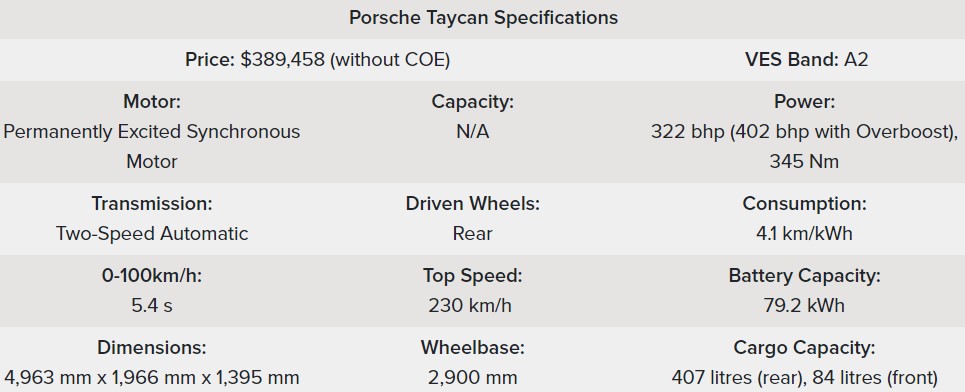Porsche Taycan review: Mission accomplished

Some eight years ago, Stuttgart-based automaker and purveyor of everyday sports cars Porsche unveiled their Mission E concept car, signalling the dawn of a new electrified era for the company.
The prototype made bold promises, assuring enthusiasts that it would be as lithe and fun to drive as the iconic petrol-powered 911, and would be at the forefront of innovation where electrification technologies are concerned. And in true Porsche fashion, the Mission E hinted at a very practical form factor – a four-door configuration not unlike the existing Panamera.
It's now 2023, and the show car has since evolved into a full-fledged production car. Riding on the newly-developed J1 platform, the Taycan shares up to 40 per cent of its components with its stellar Audi e-tron GT cousin and its RS sibling, and an eye-popping 800 V architecture for faster, more efficient charging than its rivals.
Is this then "mission accomplished" finally for Porsche?
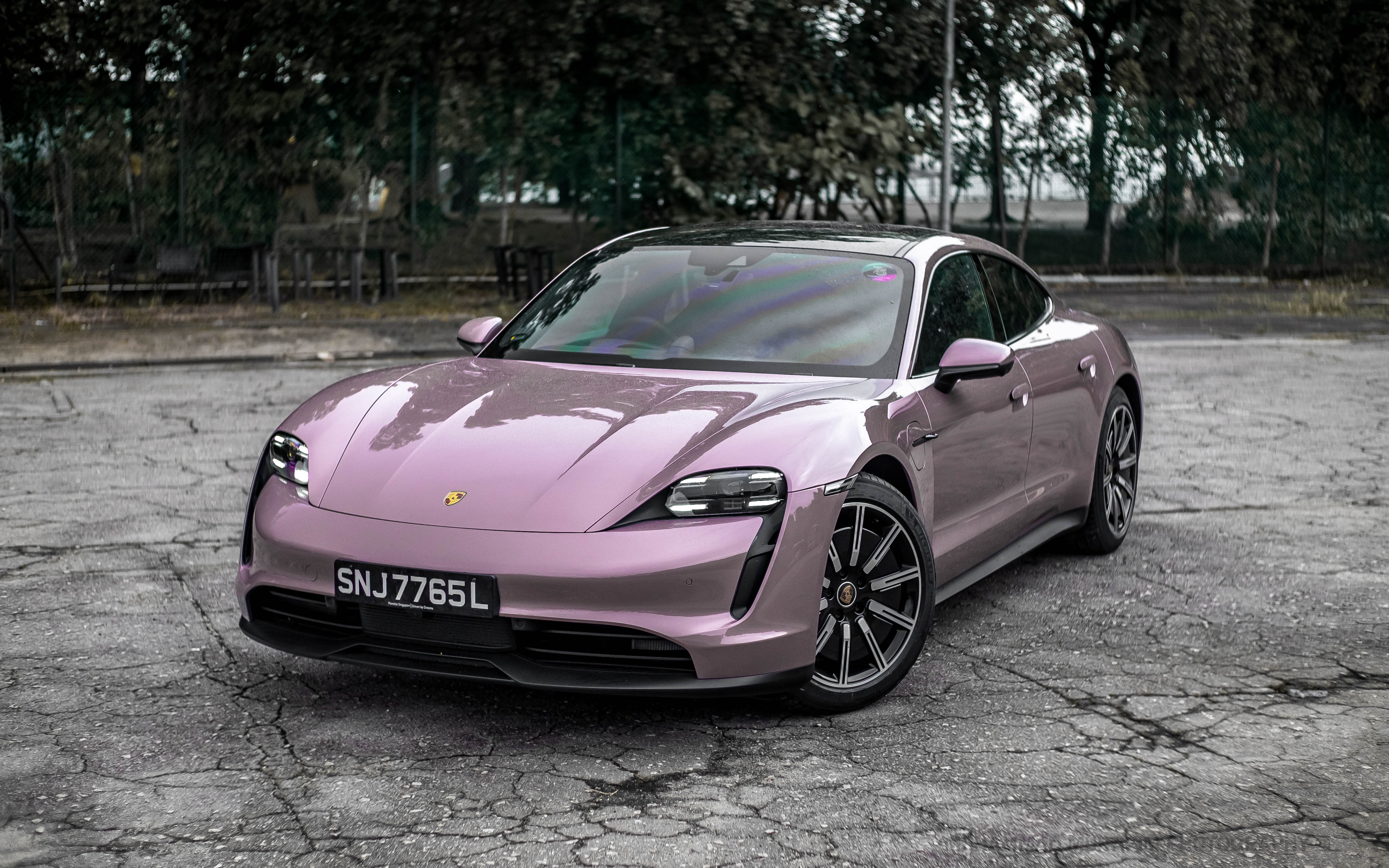
Parking the Taycan and Mission E side by side, you'd be hard-pressed to tell the two vehicles apart. They both share essentially the same silhouette, down to the sloping roofline that Porsche affectionally calls a "flyline", and a Cheshire cat-like grin on the front fascia.
Four slim LED daytime running lights dominate each headlight, giving the Taycan a distinct identity, especially in dim environments. And just like the concept car, a set of air curtains are found just below the lights, in order to cancel out any turbulence from forming over the wheels, thus increasing overall efficiency.
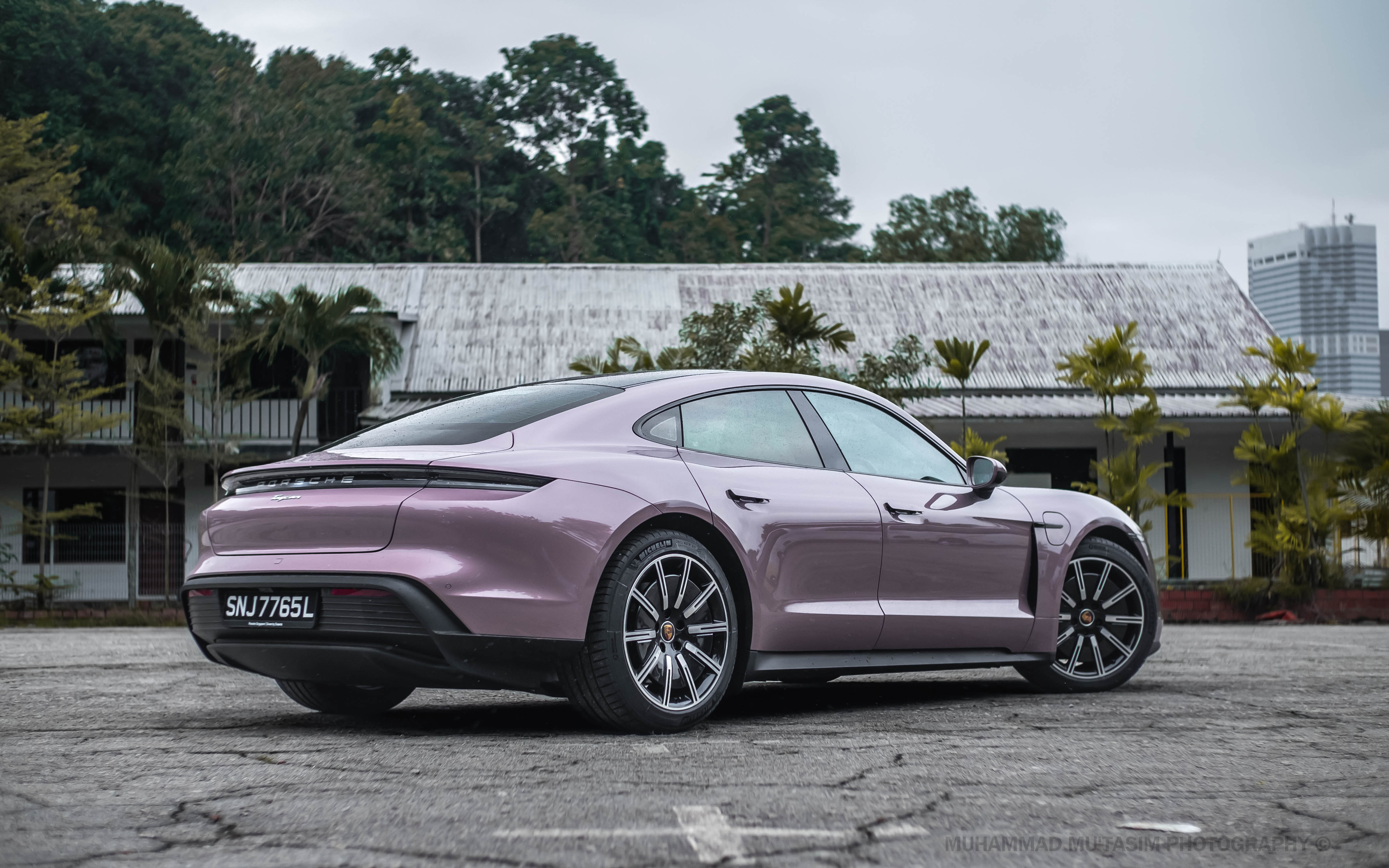
Of course, certain concessions had to be made. The Taycan does away with the muscular wheel fenders that made the Mission E a serious showstopper. A set of far less pronounced ones have been fitted instead, resulting in the electric Porsche looking more understated but admittedly less striking.
The concept car's unique suicide doors have also been replaced by traditional ones on the Taycan, bringing back B-pillars in the process.
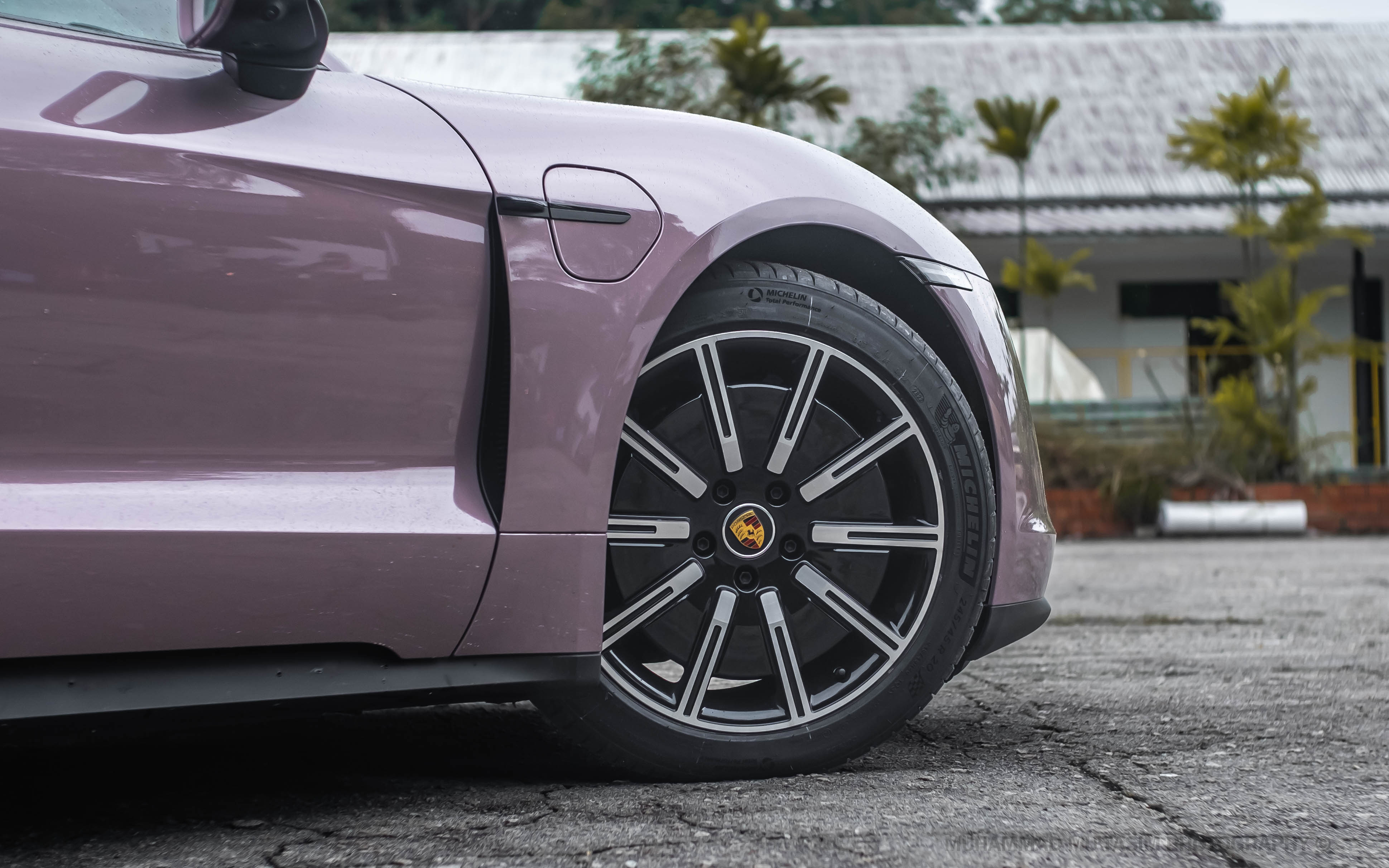
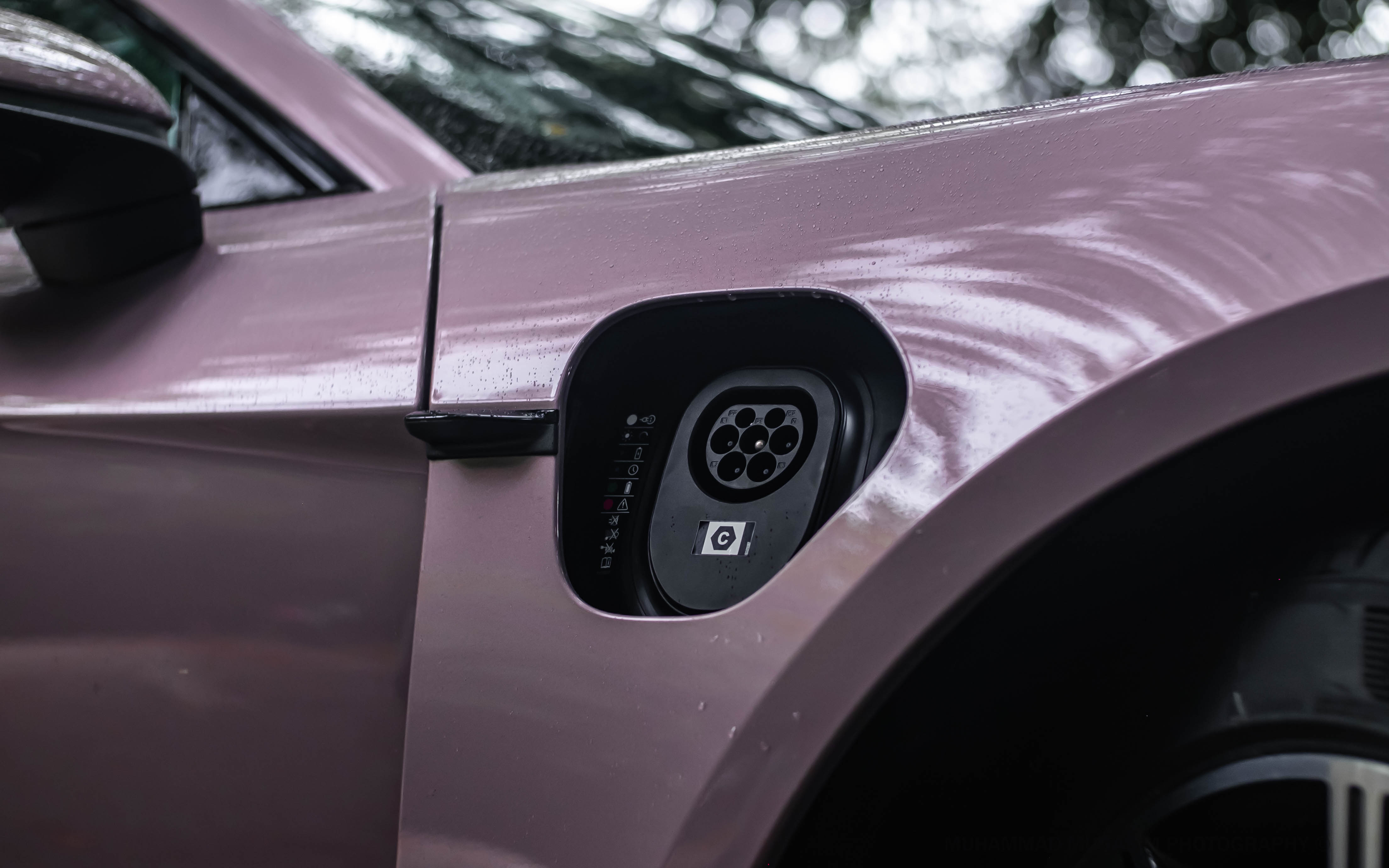
Interestingly, the Taycan comes with two separate charging ports – AC-only charging on the right and CCS Type 2 on the left. Opening the flaps can either be done by swiping one's finger across the "winglet" located next to either covers, or via the infotainment screen inside.
Equipped as standard on the Taycan is a set of generic-looking 19-inch five-spoke wheels, but we'd much rather have the optional 20-inch Sport Aero ones that our press car's equipped with, which go for $14,324.
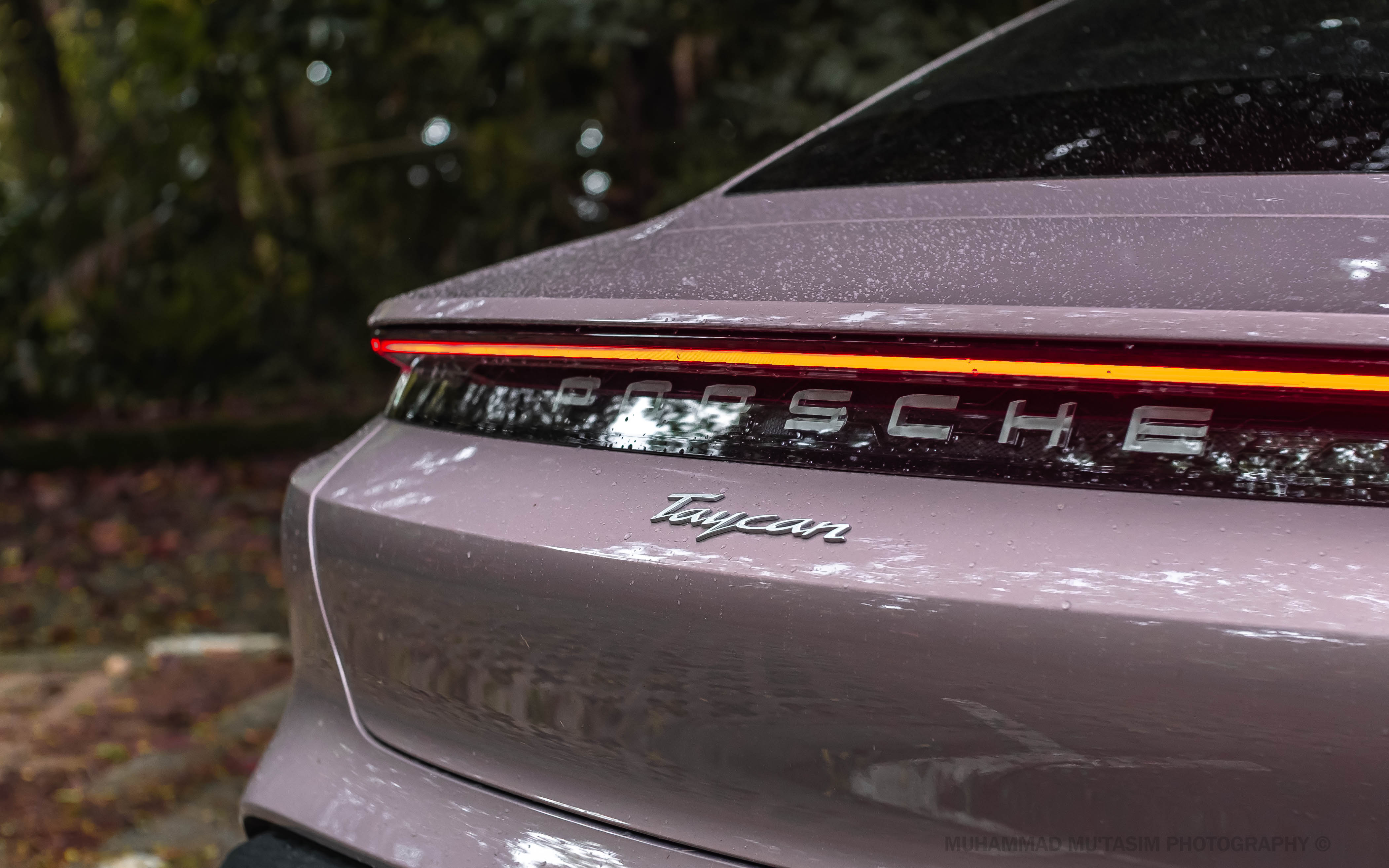
At the back, the larger-than-life diffusers have been traded away for more incognito ones, allowing the central lightbar to take centre stage at night. During the day, however, other motorists can admire the posh-looking Porsche letterings in 3D, displayed prominently behind a glass panel.
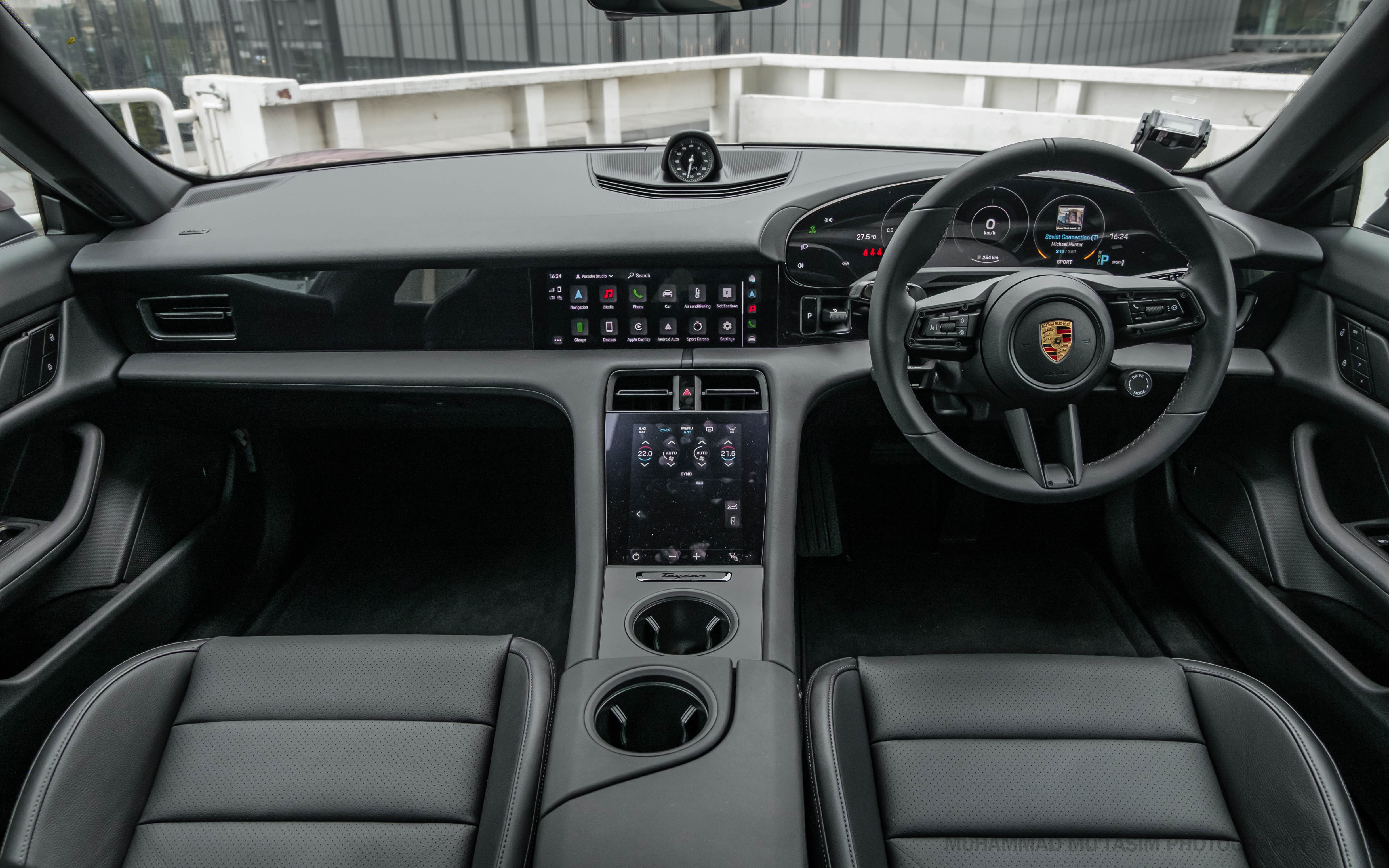
Sitting inside the Taycan, it becomes immediately clear that no corners have been cut in the manufacturing process, and no stone has been left unturned.
Every square inch of the Taycan's cabin is made of premium, soft-touch materials, effectively cocooning the owner and its occupants in luxury. To add to the user experience, the physical switchgear features excellent damping, while the console-mounted virtual touchscreen provides useful haptic feedback.
The floor-mounted batteries have also been arranged intelligently, maximising space for all occupants to sit in comfort without awkwardly bending their knees. And as you sink into the supple and cosseting seats, you'll notice that even with an all-black upholstery, the electric car still feels airy inside.
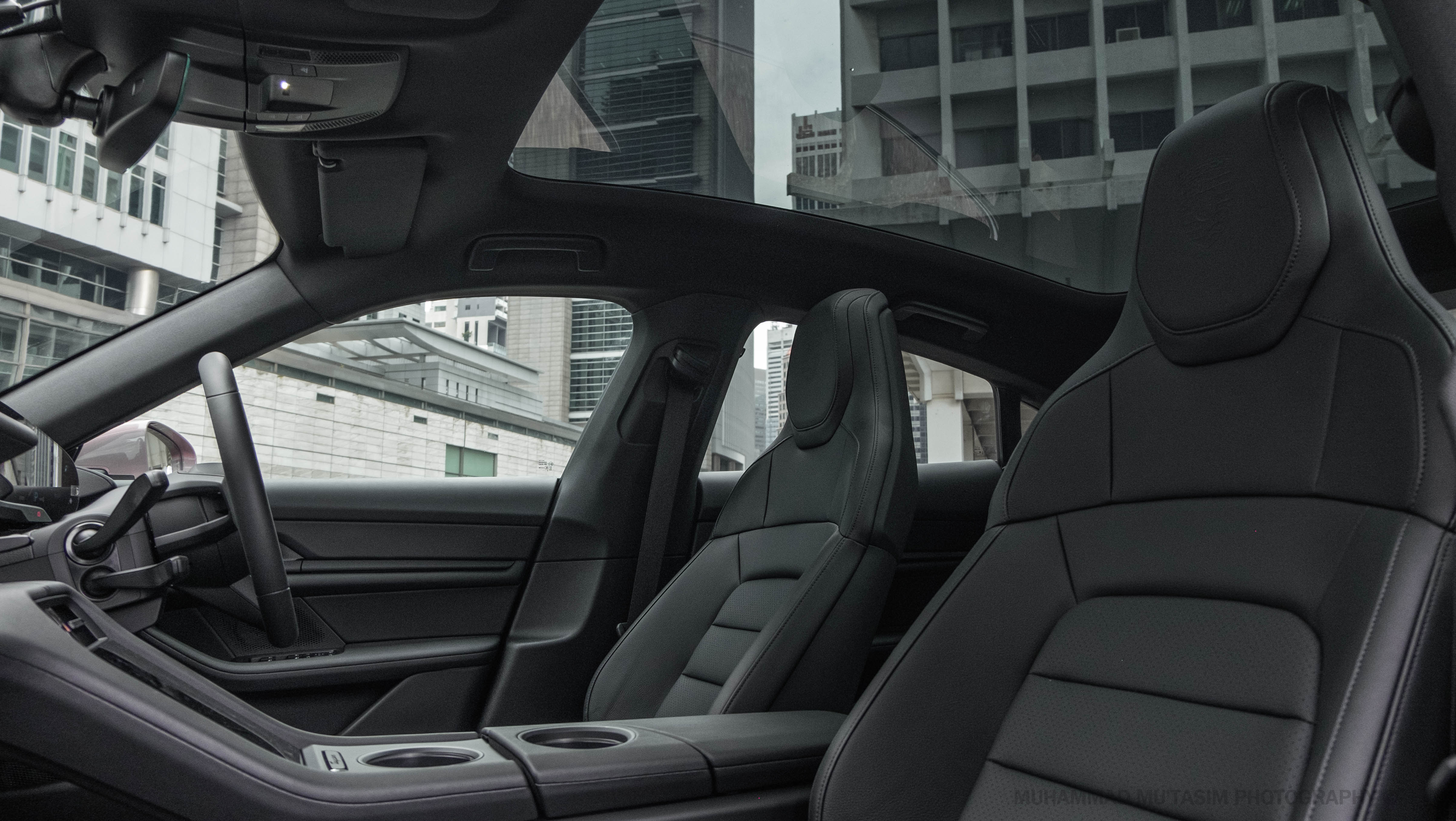
That's largely thanks to the large fixed glass panoramic roof, which like the e-tron GT, requires no transverse bow to run down the middle and obstruct the view above. Outward visibility is also excellent for all occupants, which is surprising considering the Taycan's curved beltline.
Sitting in the driver's seat, you can begin to appreciate the level of thought being put into designing the cockpit. The triple-screen setup is surprisingly logical and legible, so that the driving experience is not compromised.
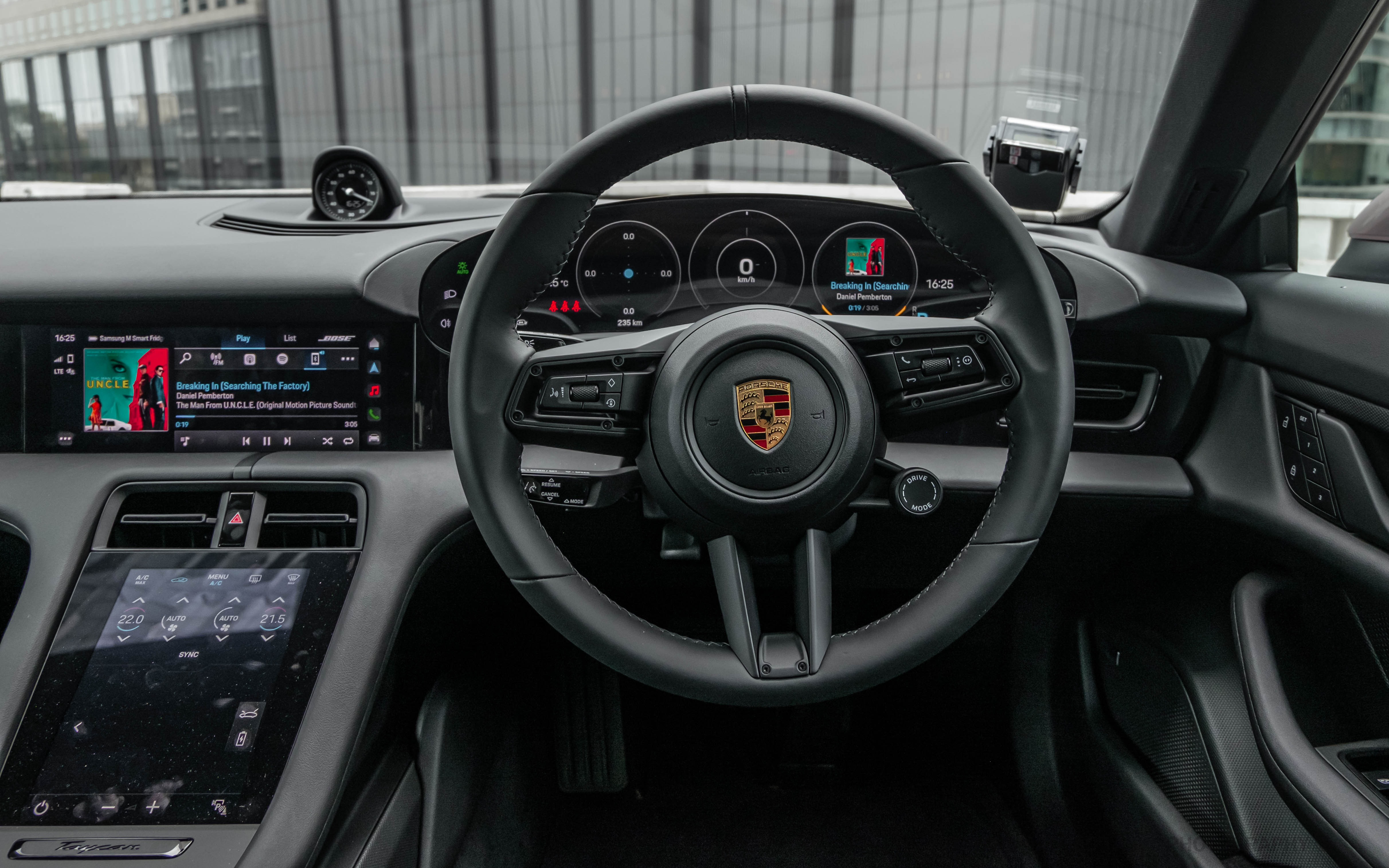
The curved 16.8-inch digital instrument cluster, for example, retains the circular gauge motif from traditional Porsches, ensuring that only relevant information is shown when the car's in motion. The corners of the screen feature touch-control fields, allowing you to toggle with the light and chassis settings easily.
You get a quintessentially Porsche steering wheel, which is thin-rimmed by modern standards and simply a joy to use due to its ergonomics.
Our press car also came with the optional Sport Chrono package, which includes an analogue and digital stopwatch on the dash, along with Individual and Sport Plus modes, the latter of which beefs up the car's performance through battery optimisation and tinkering of the car's active aero parts.
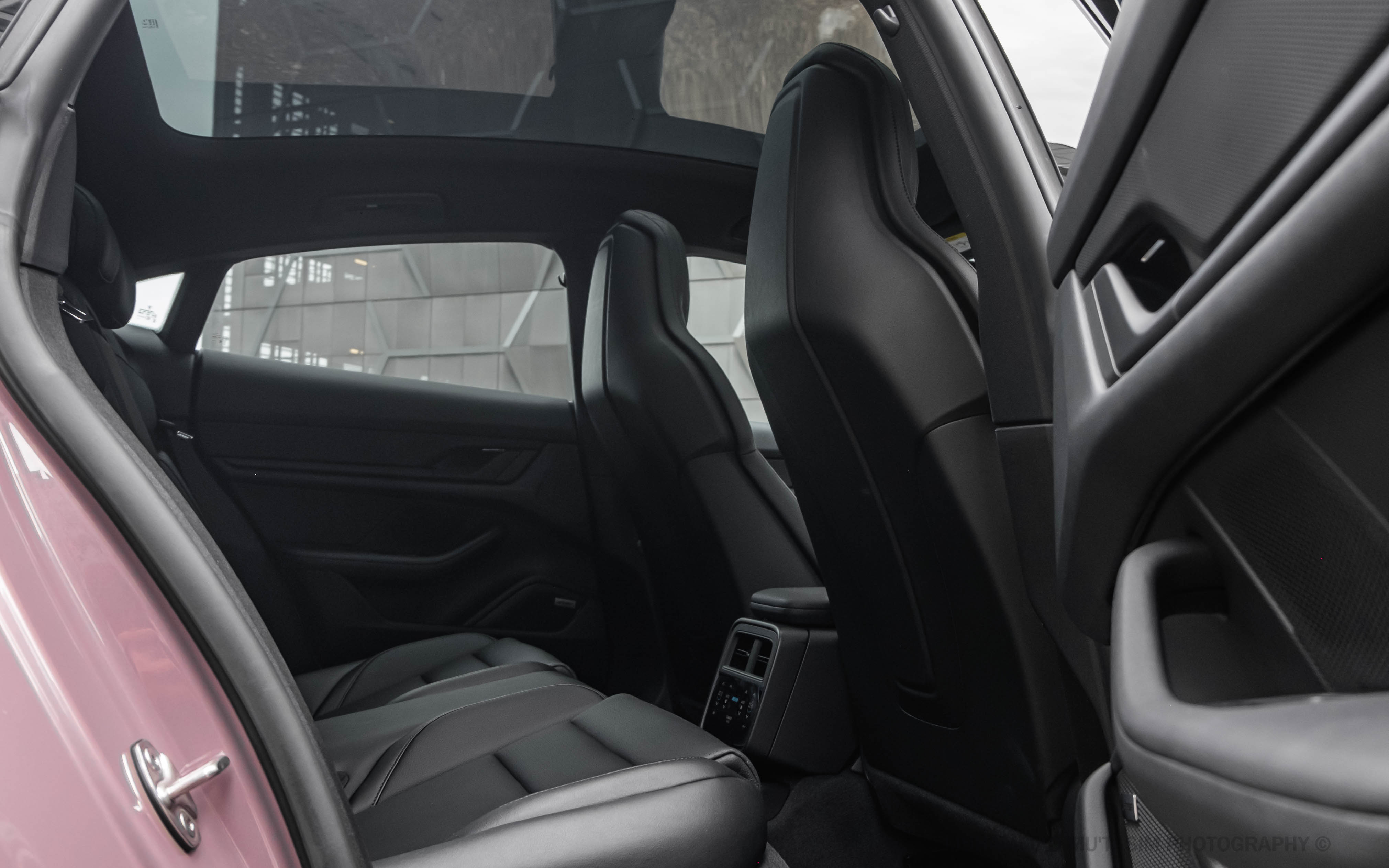
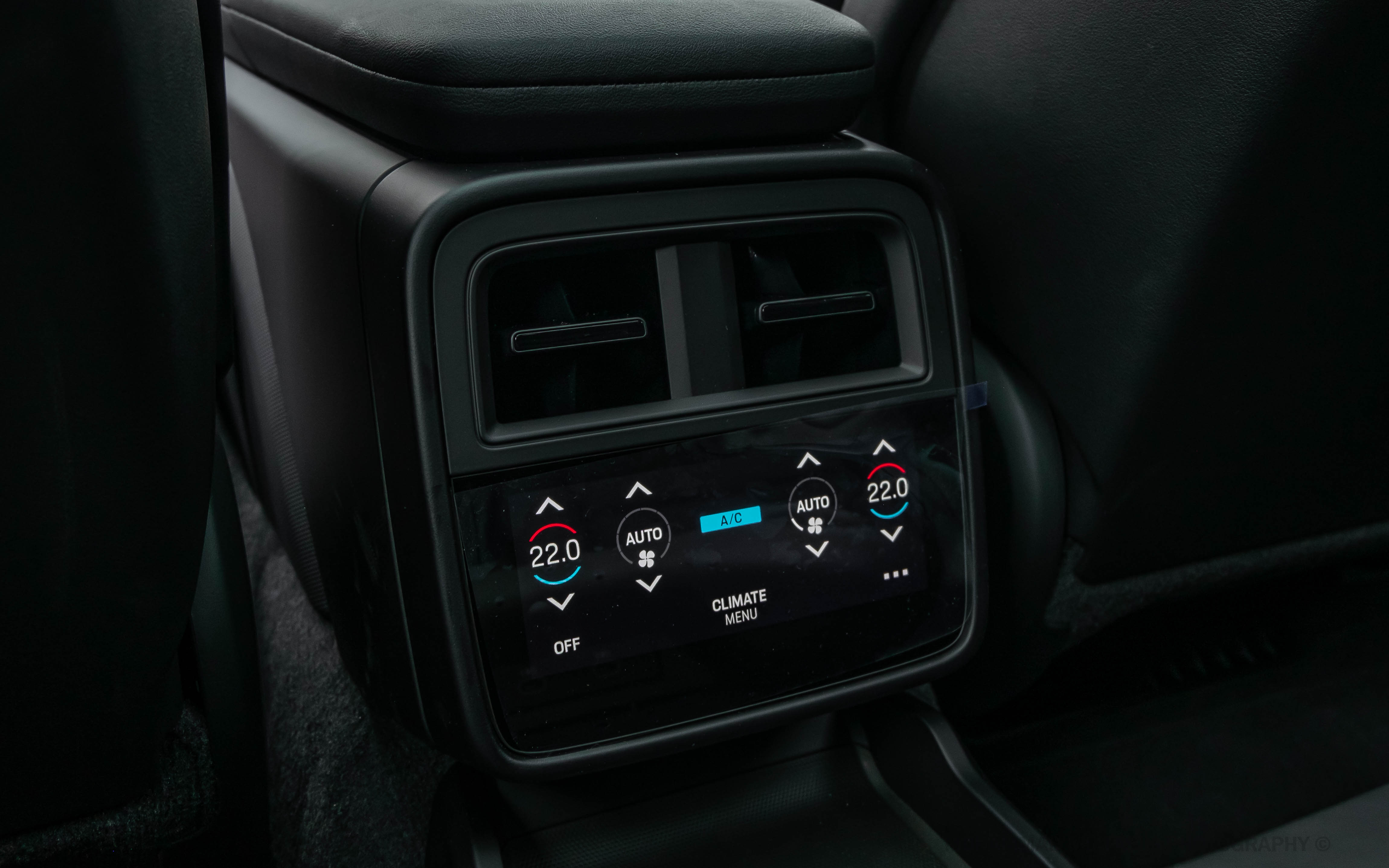
Cabin space at the back is not the best, however. During our test, rear occupants were not too keen about the sloping roof, which resulted in their heads tapping against the C-pillar during hard driving.
There's also just enough space for two full-size adults. A third middle passenger is possible, provided that he or she is a child, or is willing to share precious legroom with the floor hump.
Rear passengers will not suffer in terms of temperature, however. The Taycan comes with rear air-conditioning that's controllable via a high-res 5.9-inch touchscreen, with advanced four-zone climate control as an option, just like on the press car.
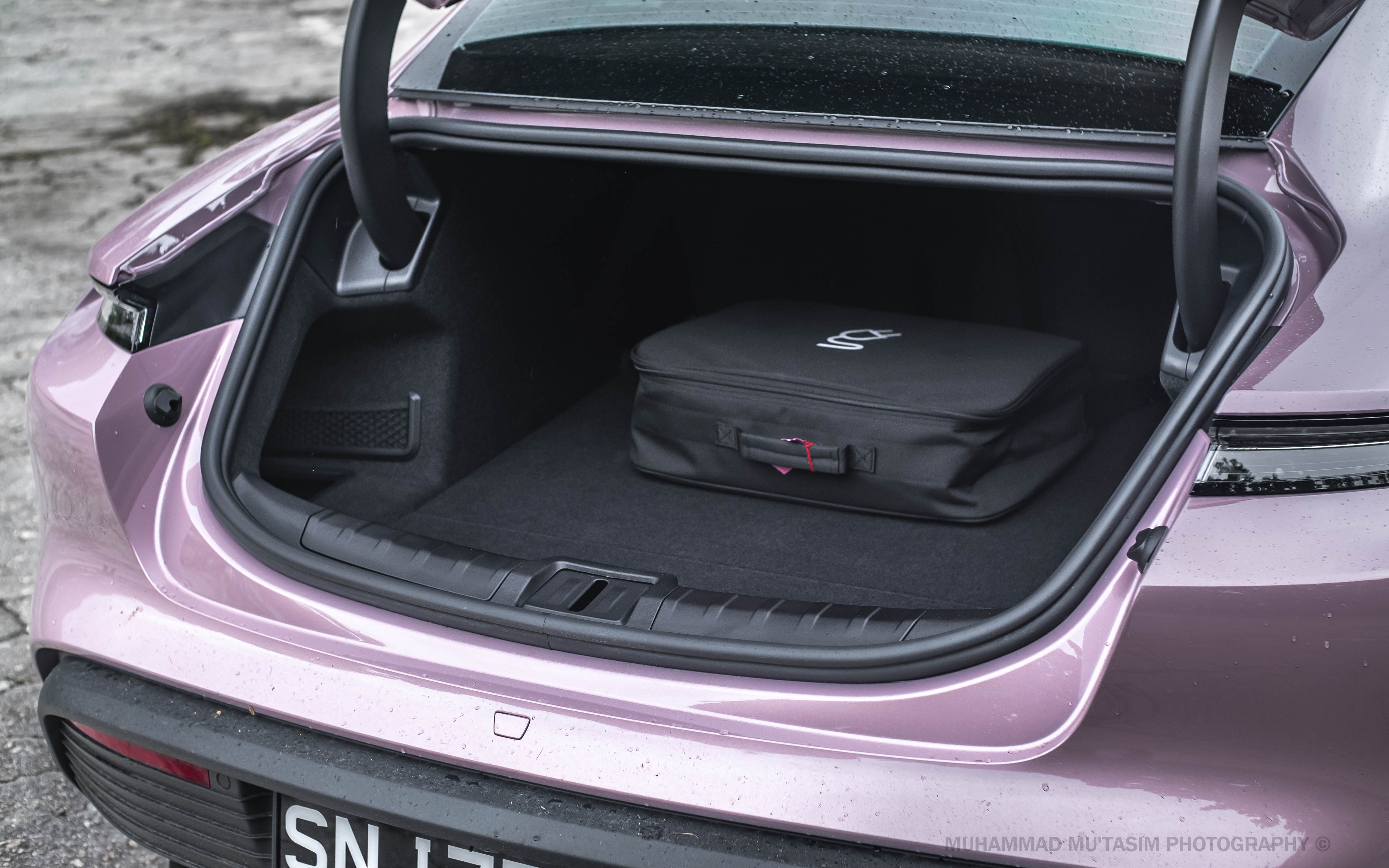
If a road trip up North with your loved ones is on your cards, do not overlook the Taycan. Despite its sporty appearance, it is a surprisingly practical car. The rear boot space offers up to 407 litres of available space, which is 50 litres more than its Audi-badged relative.
Its frunk at the front offers another 84 litres of cargo space, though it's best suited for duffel bags and the like.
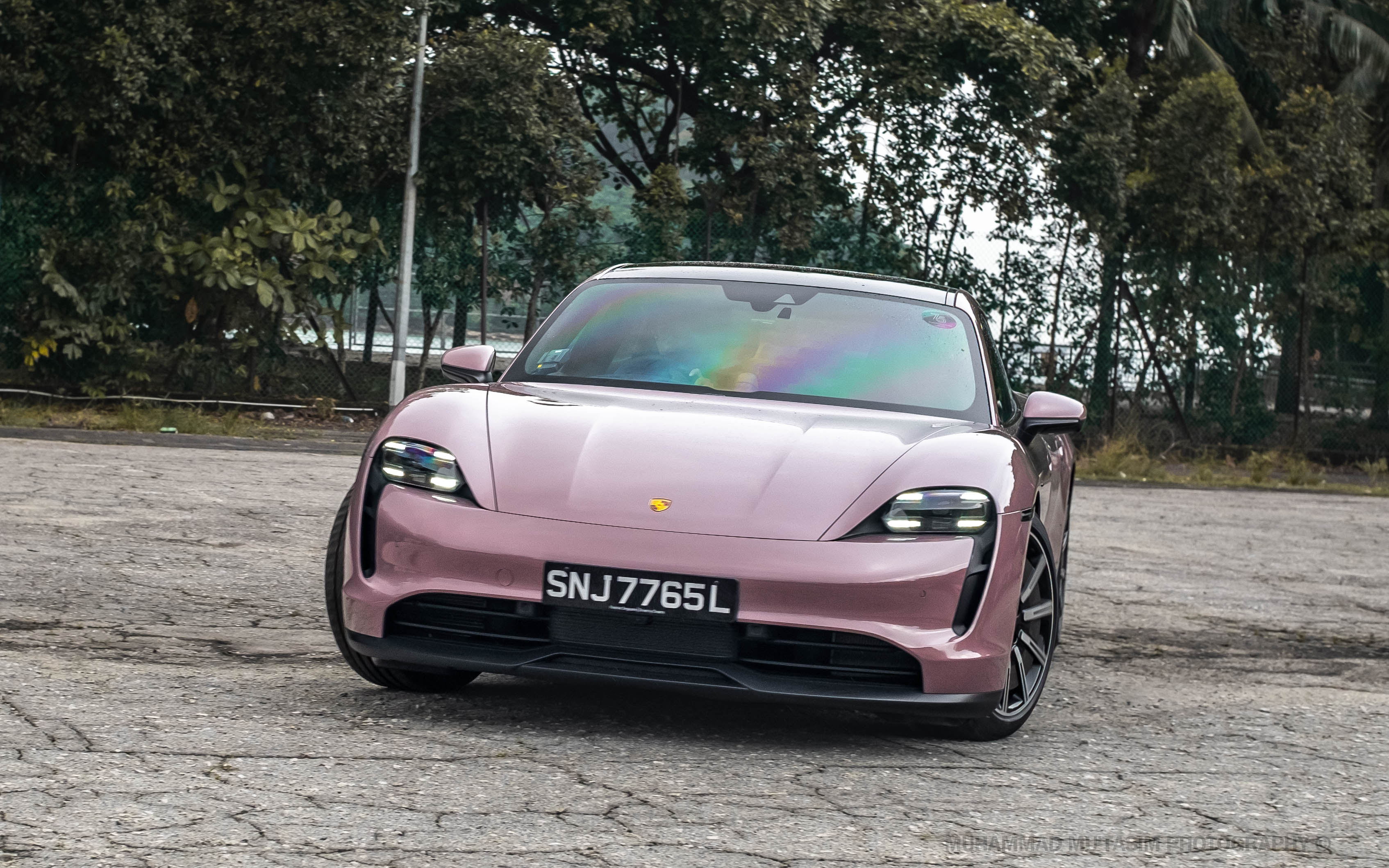
Shift the Taycan into Drive via the Braun shaver-like gear selector, and prepare to get thrusted back into the Porsche crest-embossed headrest. Even with a 2,150 kg kerb weight threatening to hold the car back, Porsche's engineering wizards have managed to make it launch like a much lighter car.
Nought to a hundred does not feel like 5.4 seconds as advertised by the carmaker, and the overengineered Porsche Electric Sport Sound definitely heightens the sensation of speed and motion.
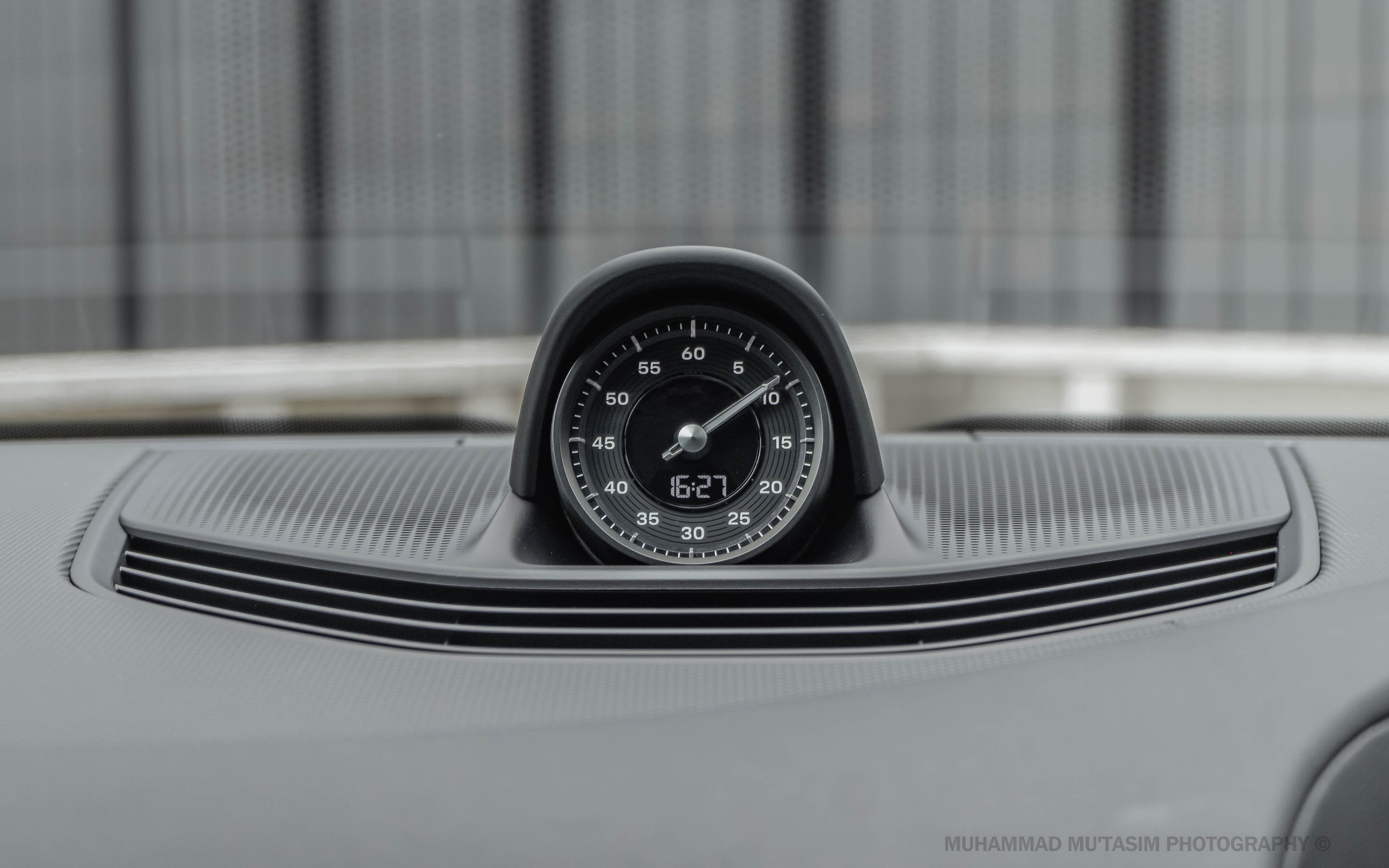
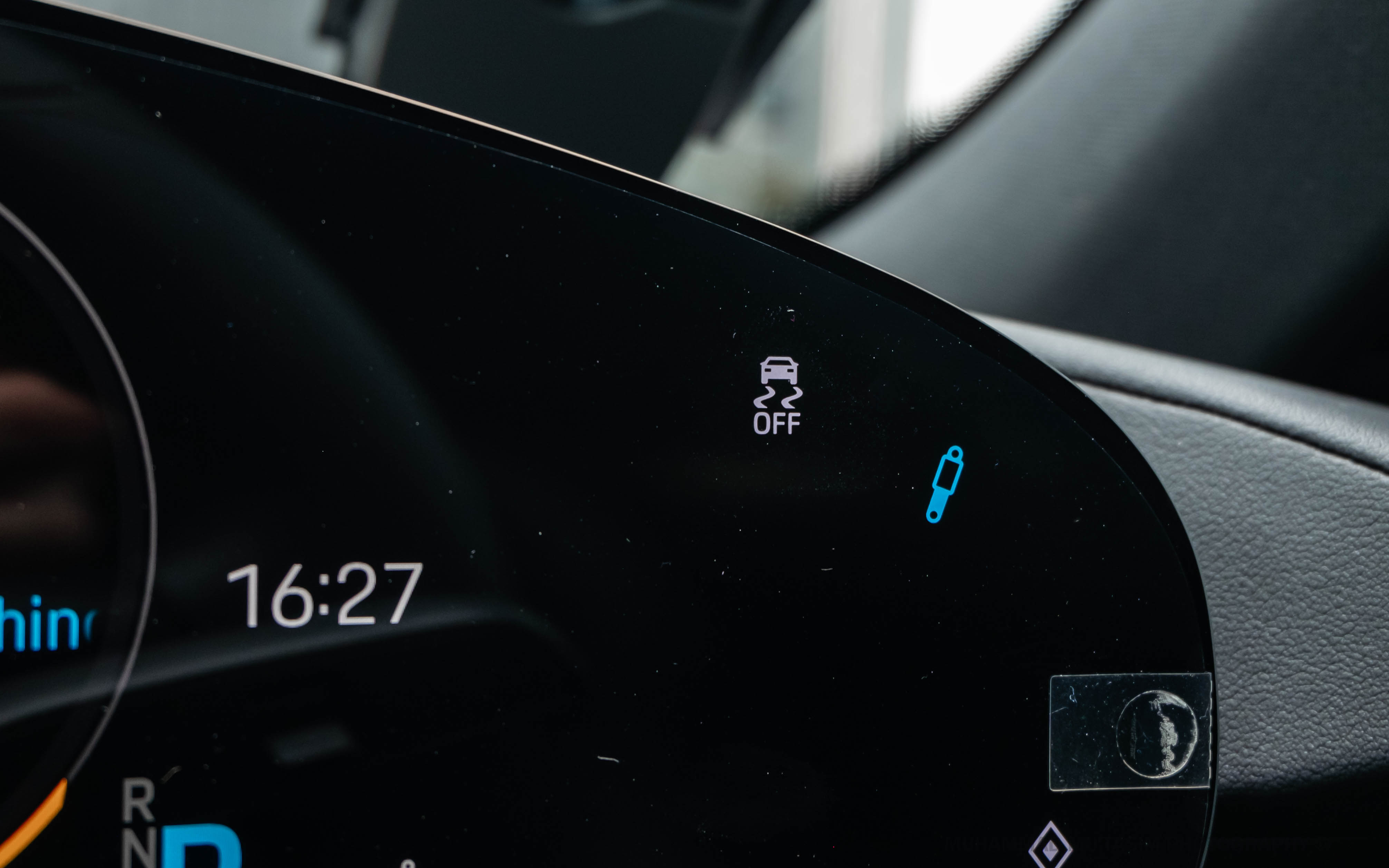
But going straight fast is only half the fun. Where the Taycan truly shines is around the corners, where it feels like no other premium EV on the market. The sweeping bends were simply no competition for the Porsche, as it attacked them with remarkable ease.
Its advanced suspension system with rear aluminium multi-links cancels out most of the body roll, and the car eggs you on to push it ever faster. Engaging Sport Plus mode, the low-slung Taycan confidently shows off its racing heritage, evoking memories of the 911 with its ultra-sharp throttle and steering response.
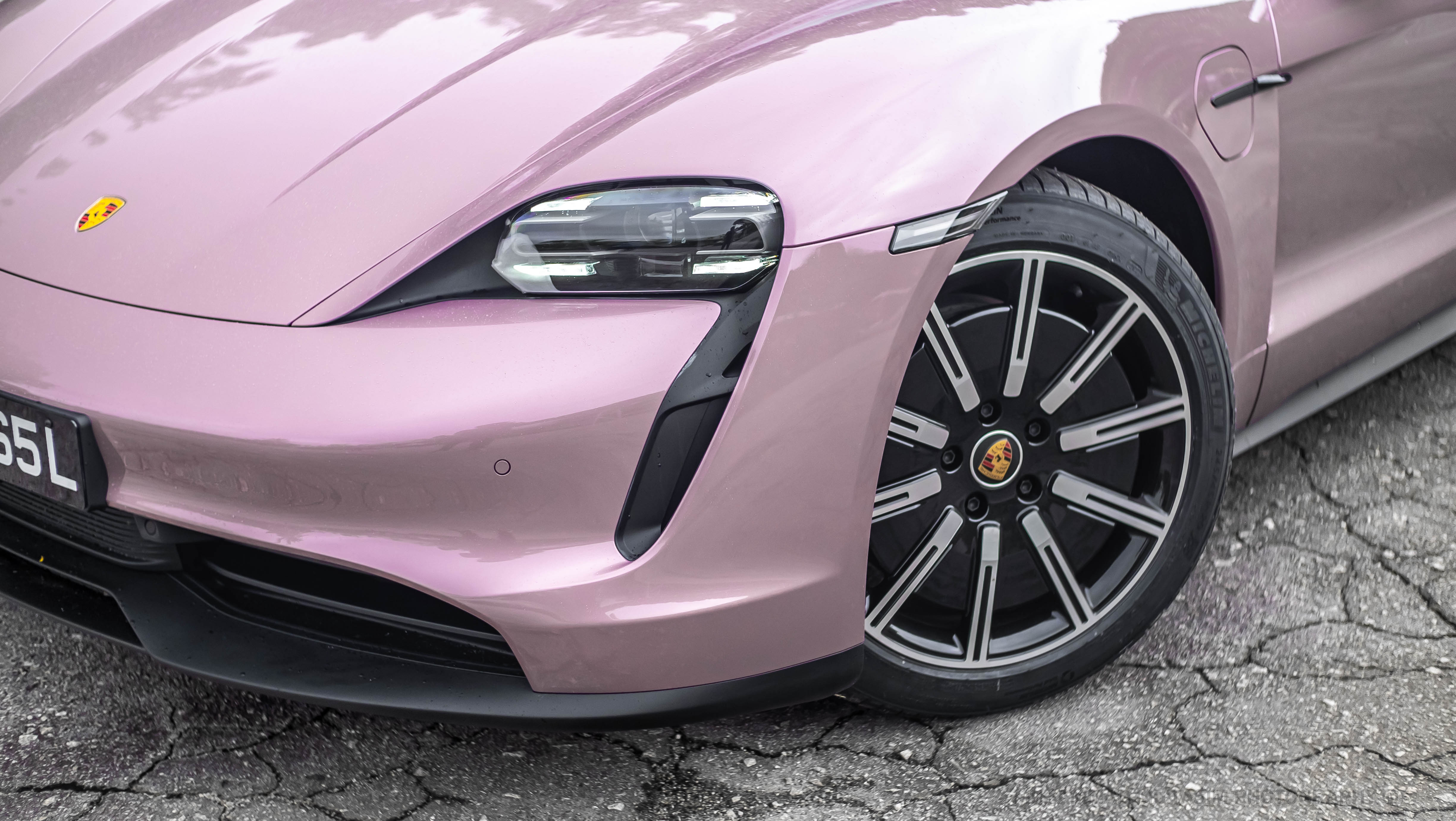
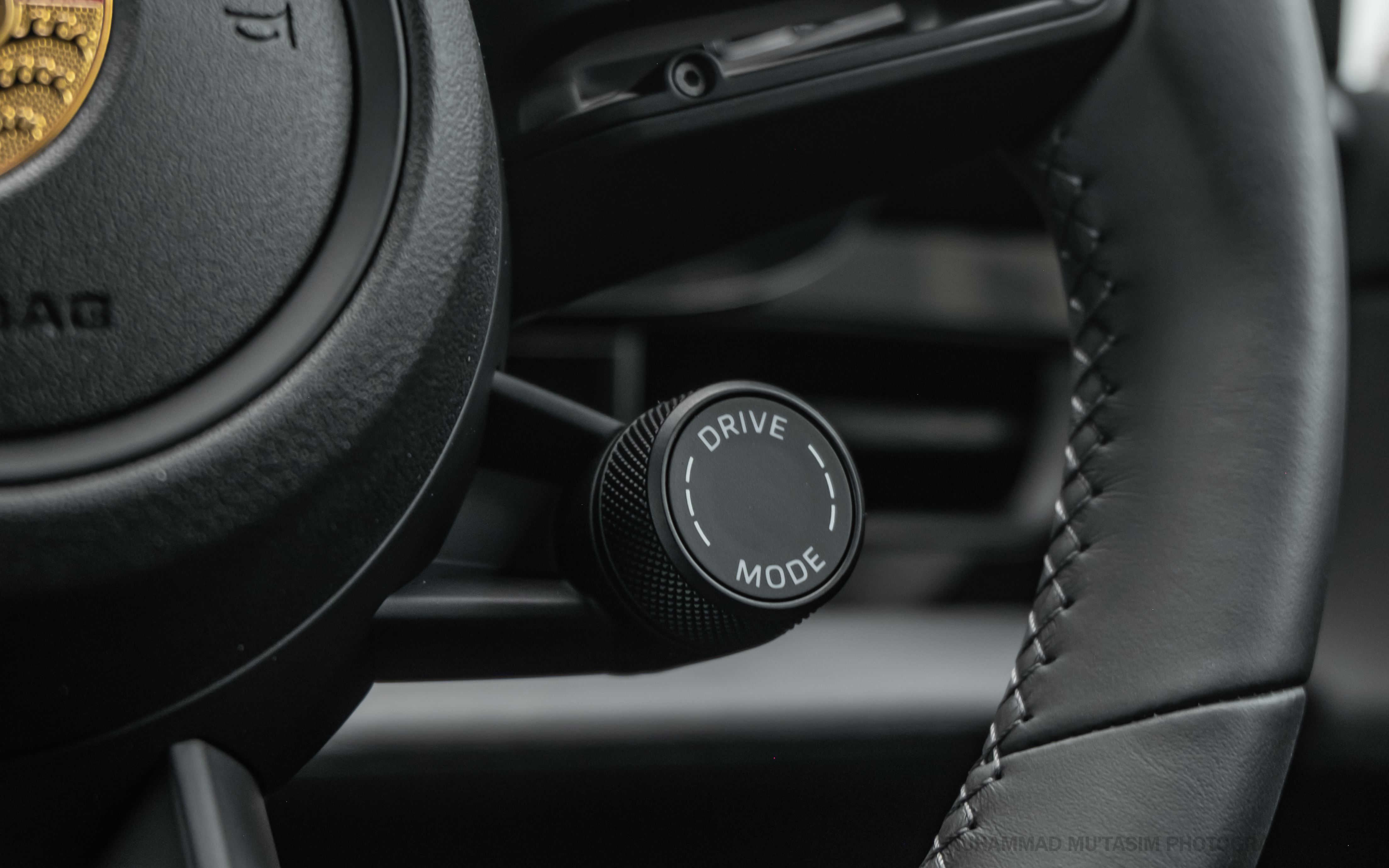
The thin steering wheel actually made the driving sensation more involving and satisfyingly old-school, with counter-oversteer maneuvers – especially with Porsche Stability Management (PSM) turned all the way off – proving to be incredible fun.
You heard that right; Porsche's first electric car is almost as engaging to drive as their greatest ever icon.
It also tops out at 230 km/h, making it the perfect cruiser. And while we never reached such LTA-unfriendly speeds, the Taycan always felt composed and was shockingly quiet, whether we were blasting down the expressways or carving corners along the back roads of Kent Ridge. The only reference to the speeds we were travelling at (apart from the speedometer) was the scenery passing by us becoming extremely blurry, extremely quickly.
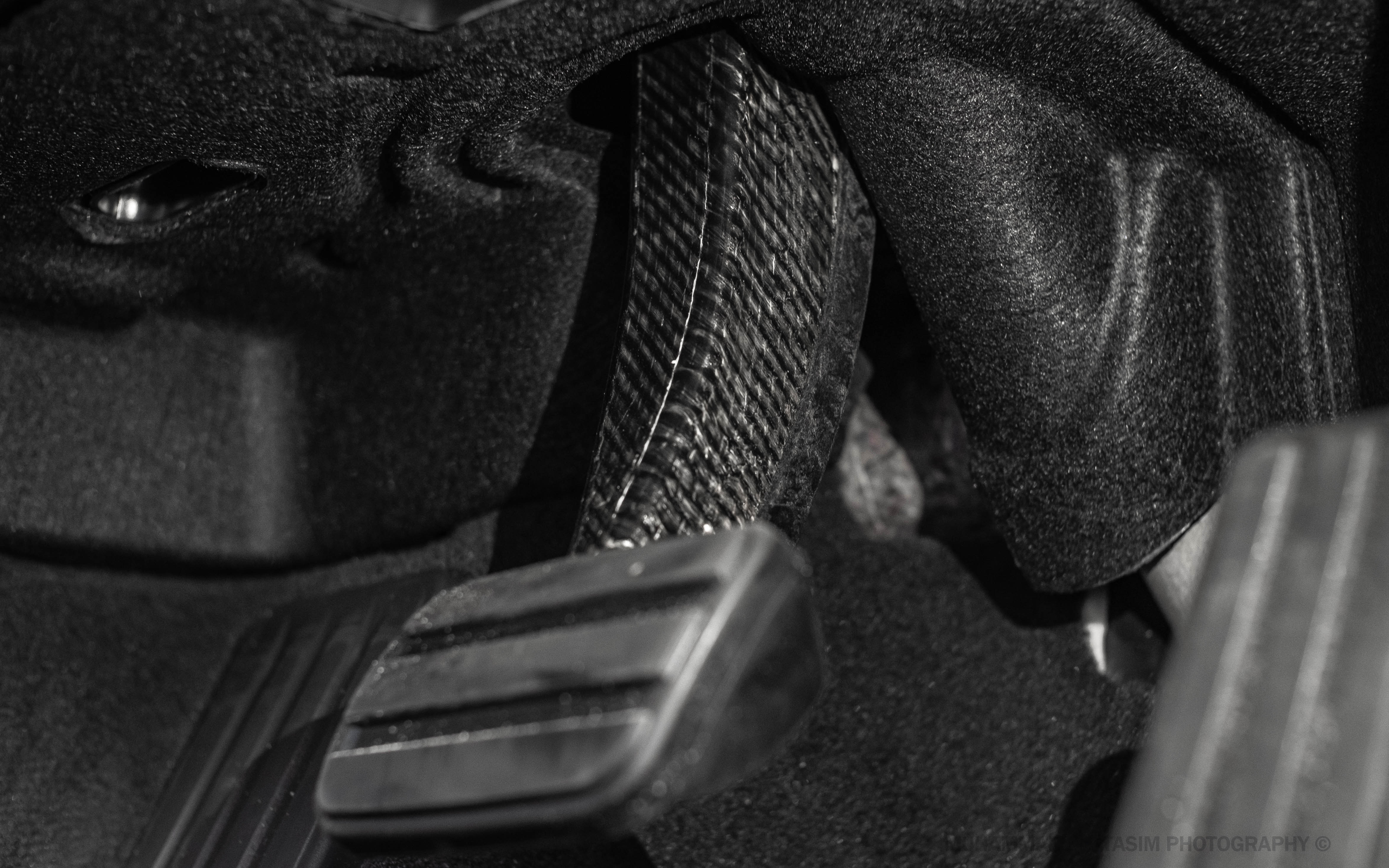
Porsche also sought out to deliver a more engaging braking sensation than its electric rivals, which led to them constructing an all-plastic assembly.
Featuring an insert called Tepex dynalite (a continuous-fiber-reinforced thermoplastic composite), the brake pedal is not only more efficient to manufacture, but also ultra-rigid and 50per cent lighter than a steel-based equivalent.
We put it to the test along various winding roads and chicanes, and the pedal felt wonderfully analogue and responsive, with the brakes seamlessly transitioning between regenerative and frictional braking, and always biting hard on command. Well done, Porsche.
ALSO READ: Porsche Taycan Cross Turismo launched
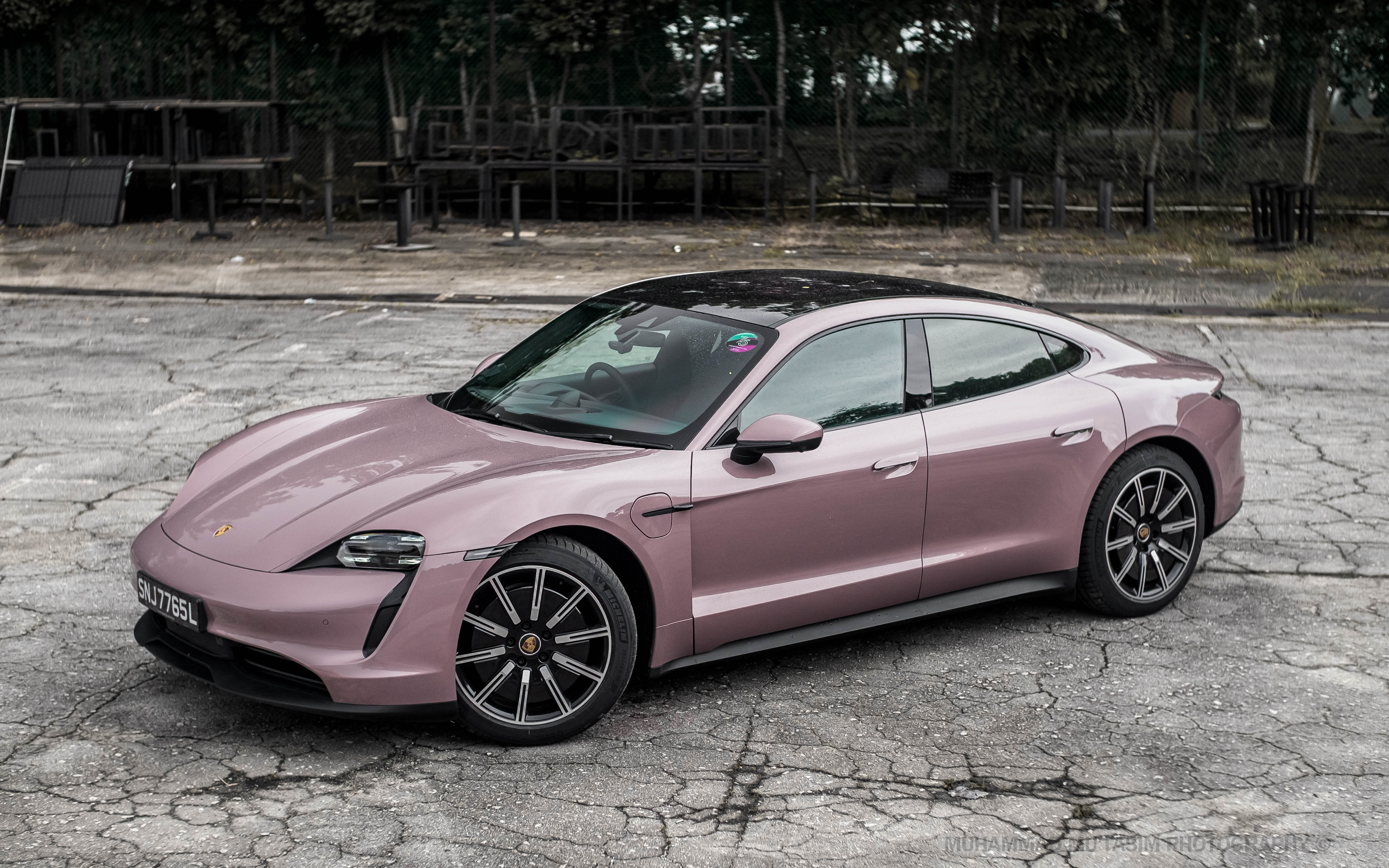
With a fully charged 79.2 kWh battery equipped, the Taycan can officially cover 353 km on a single charge. But reality is oftentimes a party pooper, and we only managed to eke out about 300 km of real-world range. That's a full 100 km less than the e-tron GT, but look at it this way: you're getting Porsche-levels of driving dynamics and racing pedigree in return. Not a bad trade deal, we reckon.
Plus, you are given several benefits should you charge the Taycan at specified Porsche Charging Destination outlets.
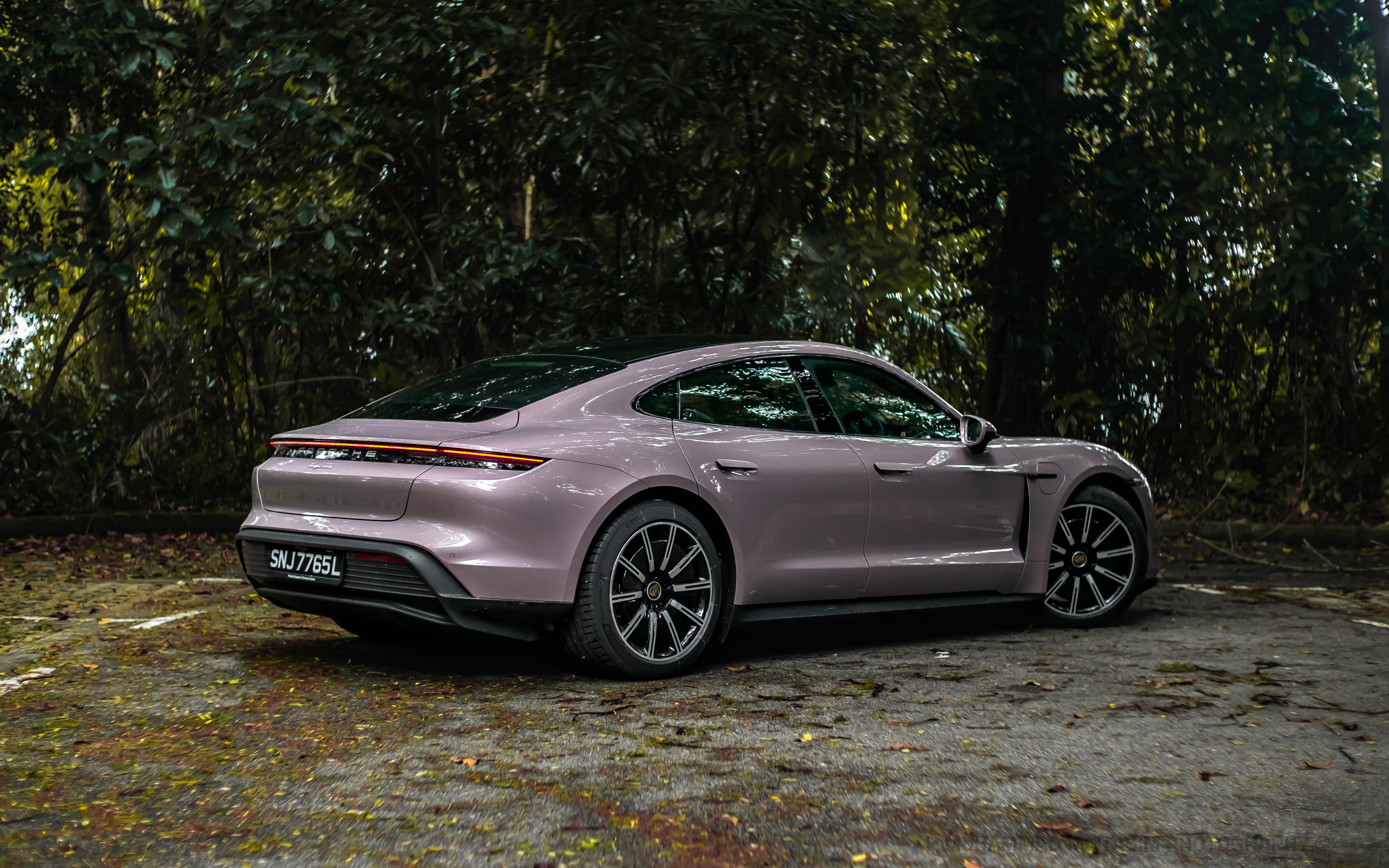
As the company's first ever fully-electric sports car, the Taycan delivers a surprisingly genuine Porsche experience, and in spades.
Superior driving performance and excellent practicality are hardly characteristics bestowed upon EVs, let alone sports ones. And even with its shortcomings such as underwhelming real-world range, you get so much more frills and thrills in return.
To answer the question posed earlier on, this is without a doubt "mission accomplished" for the German automaker.
